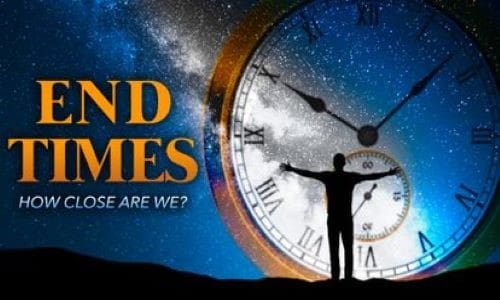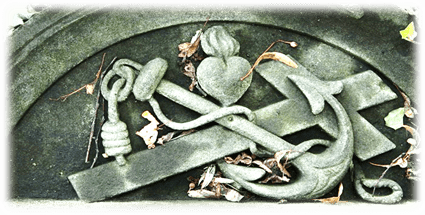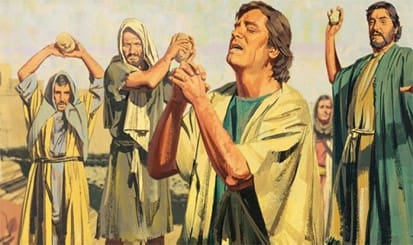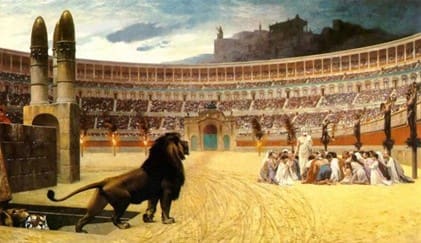The Psalmist wrote: “Forever, O Lord, Your word is settled in heaven. Your faithfulness endures to all generations.” That verse may be one we need to remember and recall daily as we face an unknown and uncertain future.
The title of this Sunday’s sermon is “Raising our Ebenezer.” While the conception of the sermon was based on the song, “Come Thou Fount of Every Blessing” by Robert Robinson, the biblical background is based upon an event in 1 Samuel 7, where Samuel set up a stone and named it “Ebenezer,” saying, “Thus far the Lord has helped us.”
We will ask each family to erect such a stone of remembrance in their home, commemorating the many times they have seen God’s hand of protection, provision, and promise, and giving them the assurance that as God has led them in the past, so will He lead them in the future.
One of the most theologically conservative professors I had at Columbia International University stunned the class one morning when he made this statement. We were near the end of the quarter, and in each class, he had drilled us about the importance of knowing the right doctrines and holding fast to the truth of God’s unchanging Word. Then he made this astounding statement:
“A person can know all the right doctrines, hold all the right theological positions, live by all the right biblical principles, but if his attitude toward others is wrong, he is totally wrong.”
Of course, that profound truth was just an echo of what the Apostle Paul said in 1 Corinthians 13:
“Love never fails. Whether there are prophecies, they will fail; whether there are tongues, they will cease; whether there is knowledge, it will vanish away. And now abide faith, hope, love, these three; but the greatest of these is love.”
This Sunday, we continue our sermon series, “How Should We Then Live?” The goal of these sermons is to understand how God expects His people to live in the world today, i.e., how we are to manifest our eternal salvation. The title of this sermon is “The Validation of Our Salvation—God’s call for His people to show we are Christians by our love.”
Over 300 prophetic signs were given in the Old Testament regarding the first coming of Jesus Christ to this earth.
Over 500 prophetic signs are given in the Old Testament regarding our Lord’s second coming to this earth – that’s one out of every twenty-five verses of Scripture or about 27%!
For some time now, those who are deliberately and intentionally tearing down our Judea-Christian culture have dared Christian conservatives to rise and say, “Enough!” Their goal is to entice us to a street brawl so the current administration can declare martial law and restrict our freedoms. Beloved, we must not “take the bait!” This is a crucial point we will explore in our current sermon series.
Retaliation is the way of the world, but we are called to a higher standard as God’s people. This is why Jesus instructed us to ‘Love our enemies.’ This is not a sign of weakness but a powerful testimony to our transformation. It is the evidence that we have been born again, and the more we respond with love, the more they will see that their persecution only strengthens us.
This Sunday, we continue our sermon series, “How Should We Then Live?” a study of the Epistles of Peter. This series aims to delve deeper into Peter’s teachings and understand how we, as God’s people, should live in today’s world. The title of this sermon is “The Validation of Our Salvation—God’s call for His people to live in Hope, Holiness, and Honor.”
The next six months may be one of the most dangerous times in our nation’s history. We are on the verge of a revolution, and as the likelihood of a massive sweeping Trump victory increases, so does the probability that we may see violence spread like wildfire.
However, regardless of the level of unruliness in the world, God has called His people to be holy. He expects those He has redeemed by the shed blood of His Son to walk differently from the rest of the world. Therefore, regardless of the challenges we may face, which may include severe persecution, God has called us to live our lives in such a way that others can see Christ in us and be drawn to Him.
Sunday, we return to our sermon series, “How Should We Then Live?” – a study of the Epistles of Peter. The title of this sermon is “The Validation of Our Salvation – God’s call for His people to live in obedience.”
· Is America in the long-term process of becoming a model of democracy, and we are at a point of recalculation?
· Is America under the judgment of God for its rejection of His Word, and we are about to be severely disciplined?
· Has America fulfilled its purpose and its imminent demise is the next step in God’s unfolding drama of our redemption?
This sermon’s title is “Is America in Biblical Prophecy?”
While I want to rejoice when I read the reports of a “flash revival” or “massive baptism,” in all honesty, I cringe. Unless those “decisions” are qualified and manifested into true “conversions,” according to Matthew 25:15, those well-meaning efforts could make that person twice as hard to reach with the true gospel.
The validation of our salvation is not manifested by a lost person’s decision but rather by the total transformation of their lives. They no longer walk according to the course of this world, doing whatever they want to satisfy the desires of the flesh. They walk in the pursuit of holiness, without which no one will see God.
The title of this sermon series is “How Should We Then Live?” The answer, of course, is to live “in Christ” so that others see the hope within us and be drawn to Him. In this sermon we will look at “The Validation of Our Salvation.”
Worship is our necessary and proper response to the gracious acts of God on our behalf. For ancient Israel, their times of worship each week, as well as their annual festivals, were in response to what God had done for them in delivering their forefathers from their bondage in Egypt. Christians gather on the Lord’s Day to celebrate and what God has done to set us free from our bondage to sin through the birth, life, death, and resurrection of Jesus Christ.
Centuries have passed, but the Jews still celebrate what God did for them in Egypt. When was the last time you celebrated your salvation? Actually, that is why we do what we do each Sunday morning when we assemble ourselves together for worship and give the Lord the glory for the many things He has done.
The title of this sermon series is “How Should We Then Live?” The answer, of course, is to live “in Christ,” so that others see the hope that is within us and be drawn to Him. In this sermon, we will look at “The Celebration of Our Salvation.”
In his latest book, “Letter to the American Church,” Eric Metaxas calls today’s Christians to wake up, stand up, shake off the cowardice that masquerades as meekness, and speak up, or else be quiet about the sinful culture in which we live today.
To quote Michael Youssef, Senior Pastor of the Church of the Apostles in Atlanta, Georgia, “If you love God’s church, and if you want people to know the truth about God, heaven, hell, and eternity, you must read the book. If you care about the kind of world your children, grandchildren and great-grandchildren will live in, you have no choice; you have to read the book.”
The title of this sermon series is “How Should We Then Live?” The answer, of course, is to live “in Christ,” so that others see the hope that is within us and be drawn to Him. In this sermon, we continue to look at “The Assurance of Our Salvation.”






